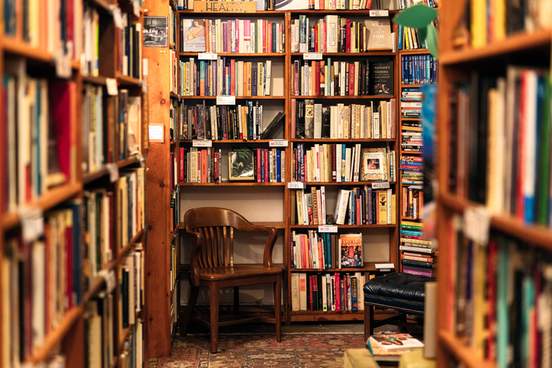
bibliomania
definition : extreme preoccupation with collecting books
Are your bookshelves overflowing? Do you feel a strong pull towards every bookstore you pass? Does your tbr pile gain books faster than you can read them? You may be suffering from bibliomania. This word dates to at least the early 1700's. It comes from French bibliomanie, from bibli- meaning “book” + manie meaning “mania”.
I am a hopeless victim of what Thomas Jefferson called bibliomania – the irresistible urge to collect and read books (Jefferson had several thousand volumes in his personal library). Usually I collect more than I can read, and I pile new books onto the giant heaps of those I hope to read later (and sometimes do, like two of the great books I’ll describe below).
— Douglas T. Kenrick, Psychology Today, 18 May 2020

florilegium
definition : a volume of writings; an anthology
The word florilegium was borrowed into English from a New Latin word that comes from Latin florilegus meaning "culling flowers." Think of a florilegium as a bouquet of writings, specially selected and arranged for your enjoyment.
In "Hermits," he pays tribute to their unsung victories, gathering in one sparkling volume a florilegium of words and deeds from the hermits of Taoist China, Cynic Greece, Yogic India, Christian Egypt, Hesychast Russia, Transcendentalist New England and Trappist Kentucky.
— Carol Zaleski, The New York Times Book Review, 5 October 1997

librocubicularist
This lovely word was formed using Latin libr-, liber meaning "book" and Latin cubiculum meaning "bedroom" (cubiculum also gives us the word cubicle). Writer Christopher Morley is credited with its coinage in his 1919 novel The Haunted Bookshop. He uses it to mean something like “someone who likes to read in bed.”
‘All right,’ said the bookseller amiably. ‘Miss Chapman, you take the book up with you and read it in bed if you want to. Are you a librocubicularist?’
Here's a more recent use:
While my husband loves books, he is not a librocubicularist. Bedtime is lights out. I had tried small book lights and various flashlights.... Even the smallest light seems to bother him....
— Kitty Lapin Agile, Two Different Girls (twodifferentgirls.com), 13 December 2013

dithyramb
definition : a usually short poem in an inspired wild irregular strain
This word comes from the Greek word dithyrambos which was the name for a wild and irregular poem honoring Dyonysus, the god of wine, who was often lauded throughout the year during festivals at which poems of this style were read. Current use is for any short irregular poem.
The history of our age is not the stuff of epic poetry. It has plenty of warfare, of course, but not much in the way of heroism; ... and its chaotic pace would chew up any meter after a dithyramb or two.
—Don Bogen, The Nation, 24 October 1994

book-bosomed
This word, apparently coined by Sir Walter Scott, is said to mean "carrying a book at all times." If you love books, certainly you've been book-bosomed at times in your life. Maybe you are currently. The sense of bosom in play here is the verb meaning "to enclose or carry in the bosom."
Away in speed Lord Cranstoun rode; / The Goblin-Page behind abode; / His lord's command he ne'er withstood, / Though small his pleasure to do good, / As the corslet off he took, / The dwarf espied the mighty Book! / Much he marveled a knight of pride, / Like a book-bosomed priest should ride: / He thought not to search or stanch the wound, / Until the secret he had found.
—Sir Walter Scott, “The Lay of the Last Minstrel,” 1805
It has some modern use (though not enough to be entered into our dictionaries):
While some islanders have gone over to the technological dark side and carry around mysterious tablet devices, there is still a certain book-bosomed populace that goes delirious at the prospect of tables piled with deliciously affordable packets of paper, neatly bound.
—Meredith M. Griffith, The Islands' Sounder (Washington), 7 August 2015

bibliotherapy
definition : the use of reading materials for help in solving personal problems or for psychiatric therapy
This word dates to at least 1914. We all enjoy a good book, but if reading for pleasure has perks beyond entertainment, even more reason to pick up a book and stay in for the night.
Studies show a range of psychological benefits from book reading. Reading fiction can increase your capacity for empathy, through the process of seeing the world through a relatable character. Reading has been found to reduce stress as effectively as yoga. It is being prescribed for depression - a treatment known as bibliotherapy.
—Meg Elkins, Jane Fry and Lisa Farrell, Sydney (Australia) Morning Herald, 15 April 2023

omnilegent
definition : reading or having read everything : characterized by encyclopedic reading
Omnilegent is formed from two Latin parts: omnis meaning "all" and legere meaning "to read." (Don’t we wish we could read it all?)
This book will be a favorite of anyone who is even a bit afflicted with logomania (a person obsessed with words) and even the most omnilegent (reading or having read everything) will find new words to add to their vocabulary.
— Jim Busch, Tribune-Review (Greensburg, PA), 26 November 2006

bookery
definition : bookstore
The origin of this alternate word for a bookstore is simple. The ending -ery, meaning “place of doing, keeping, producing, or selling” (the same ending as in eatery, fishery, and bakery) is appended to book.
We shopped together for our godchildren last weekend, and I spent a hugely pleasurable time in the nether regions of our local bookery. My husband made his choices within minutes. I didn't. So it was a rather grumpy walk back to the car.
— Margaret Clark, Sydney (Australia) Morning Herald, 21 December 2017

biblioklept
definition : one who steals books
Just because we enter this term in our dictionary, a term formed by combining biblio- and -klept (this is the same klept as in kleptomania), we cannot condone the behavior of a book thief. (And if you do prefer to obtain your books legally, we can help with that.)
Despite this, the grifter seems a romantic figure, the swashbuckling rogue. Mr. Rayner, who is British, said the confidence man was "not even a covert American hero; he is an overt American hero." It should also be noted that Mr. Rayner was himself a grifter and biblioklept and that his father was a charming embezzler who landed in jail, as recorded in the son's memoir, "The Blue Suit" (Houghton Mifflin, 1995).
—Martin Arnold, The New York Times, 6 June 2002

bibliotaph
definition : one that hides away or hoards books
We all know one (or we are one). The term bibliotaph comes from French bibliotaphe, from biblio- + -taphe, the latter of which is from Greek taphos meaning “tomb”. One famous tomb of books is that of German fashion designer Karl Lagerfeld. He is reported to have accumulated as many as 300,000 books.
A bibliophile is a lover of books. A bibliophage is an ardent reader. I confess to being both of those ''biblio'' things. Harmless enough. Or so I thought until this winter when I discovered an ugly truth (and a new word). I am a bibliotaph. I hoard books. I bring them home from the library by the basket load until I sometimes wonder if the rest of the village isn't being deprived of its reading rights with nothing left on the shelves but a few volumes on how to improve their golf game.
—Elizabeth Schuett, Cox News Service, 15 January 2001

bouquiniste
definition : a dealer in secondhand books
This fancy sounding word comes to English from French, from bouquin meaning “old book” (which is in turn from an obsolete Dutch word boeckin meaning “little book”) and the noun ending -iste. French, Dutch, or English, we love a bouquiniste.
If you've ever strolled along the Seine River, you've surely walked past the famous Parisian booksellers and their stalls. Known as bouquinistes, these often crusty old characters sell rare books, posters and historic memorabilia out of green wooden boxes mounted on the walls alongside the river.
—Eleanor Beardsley, npr.org, 7 December 2010





